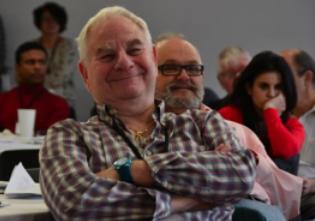Tim McCaskell admits he doesn’t know much about Twitter. But the oldest member of human rights group Queers Against Israeli Apartheid (QuAIA) says he has watched with amazement as young activists have harnessed social media to get the message out.
“Social media is being used to engage and empower activism,” he says.
In fact, the 50-plus age group is now the fastest growing demographic on Facebook and Twitter.
Local seniors took part in a Nov 28 workshop on how to use social media for activism at Opening the Closet on Aging: The 50+ LGBTQ Empowerment Conference, held at the 519 Church St Community Centre.
“The need for activism doesn’t stop just because we hit freedom 55,” educator and moderator Anna Willats notes.
Although gay seniors have seen big changes in their lifetimes, there are still rights left to be won.
Hosted by the Senior Pride Network, the two-day conference is looking at several issues facing queer seniors, such as aging, partner benefits, trans needs, wills and long-term care. Its first day focused on activism and ways to bring the community together so seniors don’t end their lives in isolation.
The audience of about 100 was a mix of seniors, family members, caregivers and health- and long-term-care professionals.
Rinaldo Walcott, associate professor and chair in the department of sociology and equity at the Ontario Institute for Studies in Education (OISE), kicked the day off with a keynote speech praising the years of grassroots activism by those now in their senior years.
“You are the soldiers who paved the way for us to come out.”
By 2036, roughly a quarter of Canada’s population will be over the age of 65, the CBC reports. About one million will be from the queer community.
Walcott says he hopes the younger generation continues with their activist tradition by working to make all queer lives more livable.
Reaching out to queer seniors is important because they are twice as likely to live alone, half as likely to have partners, half as likely to have no close relatives to call for help and four times less likely to have children to help them, compared to their heterosexual counterparts, according to Services and Advocacy for Gay, Lesbian, Bisexual and Transgender Elders (SAGE).
“This is a time to be energized with a new activism,” says Walcott. “We must engage young people.”
Discussions about aging should also move beyond hospitals and medicine, he says. Will caregivers in long-term care understand the needs of queer seniors?
“For gay men, aging is seen as repulsive,” he says. “We hear, ‘old faggot, old queer.’ It’s so important to the queer community that we retain our social spaces and our culture, like clubs and drag shows. What does it mean when we see aging just in terms of the medical model? Why can’t seniors have sex? In our culture, youthfulness is valued.”
The panel, made up of Anna Travers from the Rainbow Health Network; Rupert Raj, from the Sherbourne Health Centre; Tim McCaskell, from AIDS Action Now; and youth advocate Lali Mohamed, looked back on some of the struggles and victories throughout the gay and lesbian liberation movement.
Audience member David Dingwall asked about what support there is for gay and lesbian seniors in smaller communities. “Where do they go to ask a questions as they move into nursing homes?”
Carol Andrews came from Peterborough. She says she happened to stumble across news of the conference and made a point of attending. She says there is little support for queer seniors outside Toronto. “This is important information.”
Travers said it is vitally important that the Rainbow Health network continues to expand to reach out to all communities and to promote the health of gay, lesbian and trans people across the province.

 Why you can trust Xtra
Why you can trust Xtra


